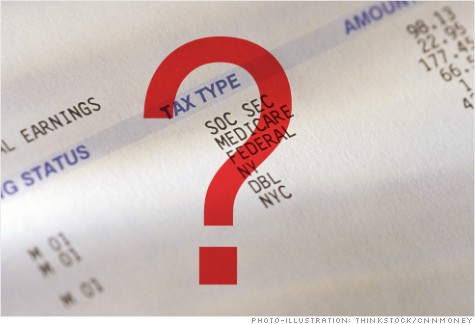
If there's no fiscal cliff deal, workers will be left wondering how big their paychecks will be.
NEW YORK (CNNMoney) -- Lawmakers may cut a deal to avert the fiscal cliff by Dec. 31. Or they may not.
If they don't, paychecks in January will get smaller and millions of workers may face weeks of uncertainty about their what their true take-home pay will be. Families that live paycheck to paycheck could feel the sting of limbo most acutely.
Here's why: If there is no fiscal cliff deal, the Bush tax cuts will expire, and everyone's tax rates will go up. That will reduce the amount of money paid to workers, because employers will be withholding more.
In addition, the temporary payroll tax holiday -- which for the past two years has boosted pay by more than $80 a month for workers making $50,000 and twice that for those making $100,000 -- will also expire, reducing paychecks even more.
Work bonuses will also be smaller because the automatic withholding rate will increase to 28% from 25%, said Michael O'Toole, senior director of government relations for the American Payroll Association.
There may be one scenario that minimizes some of the tax hit for workers while Congress continues to negotiate a deal.
Treasury Secretary Tim Geithner has the authority to leave the IRS income withholding tables unchanged even if tax rates go up, according to three former White House and congressional budget staffers.
Related: AMT is biggest fiscal cliff headache
They point to a section of the tax code that says the tables "provide such amounts to be deducted and withheld, as the Secretary determines to be most appropriate." The Treasury Department did not respond to requests for comment.
If Geithner tells the IRS not to change the withholding tables, that effectively would mean employers in January would not withhold any more money for income taxes than they do today.
That might be a tempting option if the White House and Geithner strongly believe lawmakers are on the verge of passing a deal in early 2013.
If a deal is not imminent, however, the Obama administration might not want to mute the pain of tax hikes since it would light a fire under negotiators to finalize a deal, said Steve Bell, economic policy director of the Bipartisan Policy Center.
To say nothing of the fact that it would be dangerous.
The biggest risk of leaving withholding tables unchanged? A deal that seemed a sure thing falls apart.
"If the secretary took that gamble and found partway through the year that he had been wrong, the additional withholding needed for the remainder of the year ... could be painfully high," Joseph Minarik, former chief economist in the Clinton White House wrote in the blog Back in the Black.
In other words, it's possible employers would then be instructed to withhold even more from workers to compensate for the fact that they were underwithheld at the start of the year, said O'Toole of the payroll group.
Either that or tens of millions of workers will find themselves facing a surprising tax bill when they file their taxes for 2013.
"There is nothing that taxpayers like less than discovering at tax filing time that they have a balance due instead of a refund," Minarik noted.
The bottom line: If lawmakers let the country go over the cliff for even a short while in 2013, workers will be left wondering just what they'll be paid and what they owe in taxes. ![]()
First Published: November 16, 2012: 2:21 AM ET
Anda sedang membaca artikel tentang
Fate of paychecks rests on fiscal cliff
Dengan url
http://bugarasakti.blogspot.com/2012/11/fate-of-paychecks-rests-on-fiscal-cliff.html
Anda boleh menyebar luaskannya atau mengcopy paste-nya
Fate of paychecks rests on fiscal cliff
namun jangan lupa untuk meletakkan link
Fate of paychecks rests on fiscal cliff
sebagai sumbernya
0 komentar:
Posting Komentar